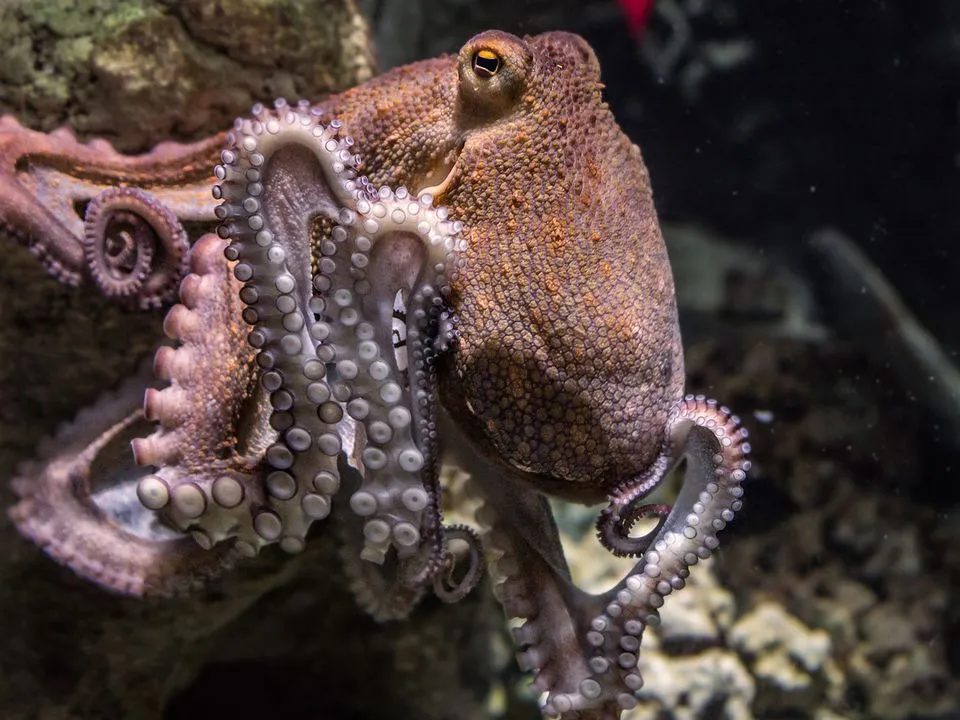
Octopuses are some of the most amazing creatures in the ocean, and their unique anatomy only confirms this fact.
This was reported by URA-Inform.
They have three hearts and nine brains, making these cephalopods some of the most complex and intelligent creatures under the sea. These features allow octopuses to not only survive effectively in deep waters, but also to display incredible abilities for camouflage, problem solving, and even display signs of intelligence comparable to mammals.
Why does an octopus have three hearts?
Octopuses have a unique circulatory system, which includes three hearts:
- One central heart pumps oxygenated blood to all organs.
- Two peripheral hearts are located near the gills and are responsible for saturating the blood with oxygen.
This system is necessary because of the special composition of octopus blood, which instead of hemoglobin contains hemocyanin, a copper-containing protein that colors the blood blue. Hemocyanin is less effective at transporting oxygen than hemoglobin, so the presence of three hearts compensates for this deficiency, ensuring constant oxygen saturation even in cold and deep waters.
When an octopus swims, the central heart temporarily stops working to reduce the load. That is why octopuses prefer to crawl along the bottom, saving energy.
Nine brains: how do they work?
The octopus brain consists of three parts:
- The central brain , located between the eyes, is responsible for processing information and making decisions.
- Eight peripheral brains , one in each tentacle, allow each of them to act autonomously.
This unique structure explains why octopus arms can move independently, explore objects, and even make decisions without commands from the central brain. Research has shown that up to 60% of octopus neurons are concentrated in the arms, allowing them to perform complex tasks such as opening cans, solving puzzles, and even using tools.
Octopus Intelligence and Abilities
Thanks to their nine brains, octopuses exhibit incredible intellectual abilities:
- Mimicry and camouflage: They can instantly change the color and texture of their skin to match their surroundings.
- Memory and learning: Octopuses are able to remember and recognize people, and distinguish shapes and colors.
- Problem solving: They open jars, navigate mazes, and even know how to turn off the electricity in aquariums.
These abilities make them some of the smartest creatures in the ocean. Some scientists even suggest that their intelligence is comparable to that of dogs and some primates.
Why did evolution give octopuses such complex anatomy?
Octopuses have no bones or shells to protect them from predators, so evolution has taken the path of developing intelligence and a unique anatomy that allows them to quickly adapt to changing conditions.
- Three hearts ensure a steady supply of oxygen.
- Nine brains give the ability to quickly respond to danger.
This combination allows octopuses to effectively survive in the harshest conditions, avoid predators and hunt successfully.
Life Underwater: How Do Octopuses Use Their Abilities?
In deep-sea conditions, octopuses use their unique abilities to the maximum:
- Camouflage: Instant color change allows you to avoid encounters with predators.
- Tactics and strategies: Octopuses can lie in wait or disguise themselves as starfish.
- Signals and communication: They change color to communicate with their peers, showing aggression or attracting mates.
These features make octopuses some of the most amazing and complex creatures in the ocean.
In conclusion
The octopus's three hearts and nine brains are not just biological oddities, but the result of millions of years of evolution aimed at survival and adaptation. Thanks to this unique anatomy, octopuses remain some of the most mysterious and intelligent creatures on the planet.
Let us recall that earlier it was reported about why the eye starts twitching: what signals the body sends.

